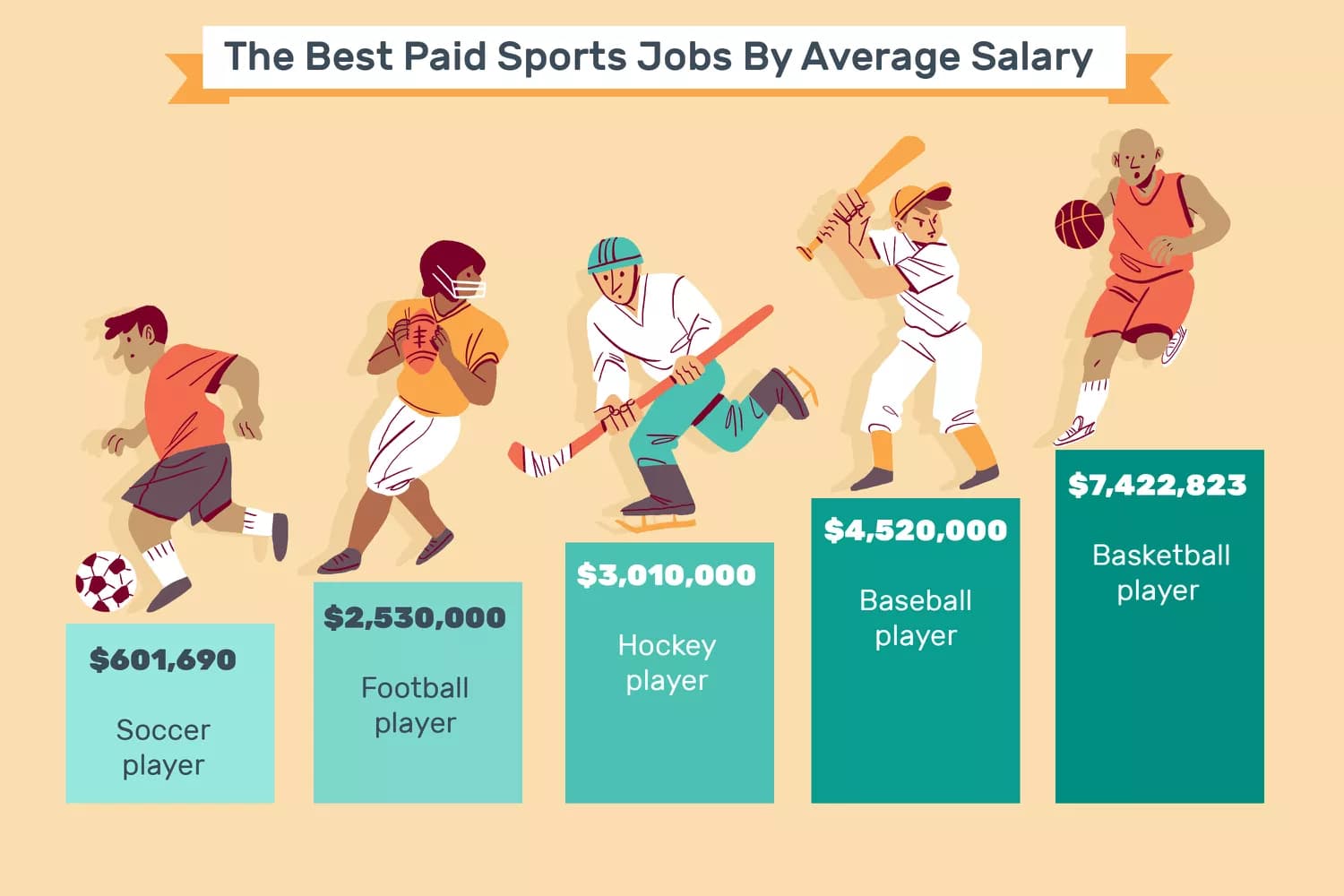In a nation that passionately embraces sports, the athletic domain has transformed into a profitable industry, opening up numerous career avenues that go beyond being an athlete on the field. From coaches and sports agents to sports medicine specialists and sports psychologists, and even sports analysts, a wide array of opportunities exists within the sports industry that can lead to substantial financial gains. In this extensive guide, we will delve into the top-paying sports professions in the United States, providing insights into the roles, responsibilities, and income potential of individuals who play significant roles in the world of sports.
The universe of sports extends well beyond the boundaries of the playing field. Behind every athlete’s success story lies a dedicated team of professionals working tirelessly to ensure their peak performance, safety, and overall well-being. These professionals occupy various roles within the sports industry, and many of them command substantial salaries. In this article, we will thoroughly explore the highest-paying sports professions in the USA, shedding light on careers that enable individuals to combine their love for sports with financial success.
Sports Physicians: Healing Champions

Sports physicians are medical experts specialized in treating athletes’ injuries and ensuring their optimal physical health. They work closely with athletes to diagnose, treat, and prevent injuries, aiding in their swift recovery and peak performance. These healthcare professionals often earn substantial incomes due to their crucial role in an athlete’s career.
Sports Agents: The Deal Makers

Sports agents are the unsung heroes behind athletes’ contracts and endorsements. They negotiate on behalf of athletes to secure lucrative deals with teams and brands, ensuring their financial well-being. The commissions earned by sports agents can be substantial, particularly when representing top-tier athletes.
Sports Psychologists: Mentally Preparing the Pros
Mental health is pivotal in sports, and sports psychologists play a pivotal role in helping athletes manage stress, anxiety, and performance-related issues. These professionals employ various techniques to enhance an athlete’s mental resilience, and their services are highly valued in the sports industry.
Sports Analysts: Decoding the Game
Sports analysts dissect every facet of a game, offering valuable insights to teams, coaches, and fans. They utilize data, statistics, and their deep knowledge of the game to provide informed perspectives. Many sports analysts enjoy substantial salaries, particularly in the realm of professional sports.
Coaches and Managers: Guiding the Stars
Coaches and managers are instrumental in an athlete’s career, providing guidance, training, and strategic direction. Successful coaches, especially in high-profile sports, can earn significant incomes, reflecting their impact on a team’s success.
Sports Marketing Executives: Building Brands

The sports industry relies heavily on marketing and branding. Sports marketing executives are responsible for promoting teams, athletes, and events. Their ability to create compelling marketing strategies can lead to substantial financial rewards.
Athletic Directors: Overseeing Sports Programs
Athletic directors manage sports programs at educational institutions, overseeing various aspects including budgets, facilities, and staffing. These positions are well-compensated, especially in colleges and universities with prominent athletic programs.
Sports Lawyers: Protecting Athlete’s Interests
Legal issues frequently arise in sports, from contract disputes to intellectual property matters. Sports lawyers represent athletes, teams, and organizations, earning sizable fees for their legal expertise.
Sports Broadcasters: The Voice of the Game
Sports broadcasters bring the excitement of sports to fans worldwide. Their commentary and analysis are integral to the sports viewing experience, and top broadcasters can command significant salaries.
Scouts and Talent Recruiters: Finding Tomorrow’s Stars
Scouts and talent recruiters identify promising athletes at the grassroots level. Their ability to spot talent early can lead to rewarding careers in professional sports organizations.
Physical Therapists: Keeping Athletes Fit
Physical therapists aid athletes in recovering from injuries and maintaining peak physical condition. Their role is indispensable in the world of sports, and they are well-compensated for their expertise.
Nutritionists and Dietitians: Fueling Performance
Nutritionists and dietitians design customized diets to optimize athletes’ performance. Their contribution to an athlete’s success is highly valued, and many work with elite athletes, earning handsome salaries.
Do you want to make money on sports betting? Find out what Positive EV Betting is in our new article. You will learn what value bets are, how to do them correctly, and how much you can earn on sports events!
Sports Engineers: Innovating Equipment
Sports engineers design cutting-edge equipment and technology to enhance athlete performance and safety. Their innovations are in high demand, and they can earn significant incomes in the sports industry.
In conclusion, the realm of sports offers a multitude of gratifying career possibilities beyond simply playing on the field. From sports physicians to sports engineers, individuals in various roles make substantial contributions to the industry’s success. These professions not only allow individuals to pursue their passion for sports but also offer the potential for significant financial rewards.
FAQs
What is the average salary of a sports agent in the USA?
The average salary of a sports agent varies widely but can range from $50,000 to several million dollars annually, depending on the clients they represent.
Do sports psychologists work with athletes from all sports?
Yes, sports psychologists work with athletes from various sports, assisting them with mental preparation and performance enhancement.
How much do sports broadcasters earn on average?
Earnings for sports broadcasters can vary significantly, but established ones can earn several hundred thousand to millions of dollars annually.
What qualifications are required to become a sports engineer?
To become a sports engineer, one typically needs a bachelor’s or master’s degree in engineering, with a specialization in sports technology or biomechanics.
What are the primary responsibilities of athletic directors at colleges and universities?
Athletic directors oversee the administration of sports programs, including budget management, facility maintenance, and staffing decisions, among other responsibilities.
